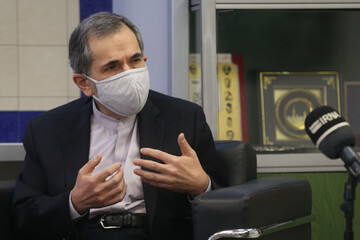Takht Ravanchi told IRNA in an exclusive interview that American officials should end their hostility towards Iran and recognize that the Islamic nation is a powerful country in the region, which is eager to keep peace with its neighboring countries based on international regulations.
IRNA: Is the 2015 Iran nuclear deal in its final days or is there any hope to revive the international agreement?
Takht Ravanchi: The accord, dubbed the Joint Comprehensive Plan of Action (JCPOA), is not in a good situation, because certain signatories to the deal did not comply with their commitments, and even prevented other parties from abiding by their obligations. Following the US withdrawal from the JCPOA in May 2018, Europeans promised to carry out their undertakings, but they failed to pave the way for Iran to continue trade ties with other states. According to several reports by the International Atomic Energy Agency (IAEA), Iran abided by its commitments under the JCPOA. If the signatories to the deal want to preserve it, they are expected to comply with their own obligations too. However, it is hard to predict if it is possible.
IRNA: After the Iranian parliament approved a law obliging the government to enrich uranium at 20%, has Russia said that Iran is reducing its commitments under the JCPOA, which means Tehran is on the verge of withdrawing from the deal?
Takht Ravanchi: Russia has not said Iran is on the verge of withdrawing from the JCPOA. The Iranian government is obliged to implement the law approved by parliament, because the legislation is binding. Iran has started scaling back its commitments following the US withdrawal from the JCPOA. Of course, Iran underlined that there is no limitation for the level of enrichment for peaceful purposes according to the Non-Proliferation Treaty (NPT).
IRNA: Is there no restriction for uranium enrichment under the NPT?
Takht Ravanchi: The NPT has put no ceiling for the uranium enrichment. The amount of fuel you need for a power plant or a submarine is clear; so, there should be no problem as long as the nuclear activity is for peaceful purposes.
IRNA: Wasn’t it hasty to begin the 20% enrichment?
Takht Ravanchi: Iran requires fuel enriched at 20% for the Tehran power plant. It is common throughout the world that countries produce fuel and keep it for when they need it.
IRNA: How do you evaluate the change of tone by the Europeans towards Iran, at a time when the upcoming US administration says it wants to put aside outgoing president Donald Trump’s unilateralism and adopt a multilateral stance especially in dealing with Iran?
Takht Ravanchi: It is not clear what the incoming US administration would do. However, Tehran would react based on what the Biden administration would do concerning the JCPOA. Iran is in no rush. Tehran would wait and see the US practical measures in this respect, but it should be clear whether Washington would fully abide by its international commitments. The Europeans are expected to comply with their own obligations under the UN Security Council’s Resolution 2231 that endorsed the Iran nuclear deal.
IRNA: How long would Iran wait for other signatories to meet their commitments?
Takht Ravanchi: The stance of the Islamic Republic is clear, it is complying with its commitments under the JCPOA. Therefore, Iran acts based on its international obligations as well as its laws approved by parliament. If the US returns to the nuclear accord, Iran will reverse its measures to roll back its commitments. It is impossible to exactly determine how long Tehran will wait until other parties resume full compliance. The Iranian officials will at the first stage make a decision based on the country’s national interests.
IRNA: What will Tehran do to prevent anti-Iran lobbies from pressing ahead with their agenda regarding the nuclear deal?
Takht Ravanchi: The Zionist regime and certain Arab states are busy hindering the US return to the accord and the Islamic Republic does not have any lobby in the US, but Iran uses diplomacy to inform other countries that its rights have not been respected.
IRNA: US President Trump has imposed sanctions on Iran. Is it possible that the upcoming administration says the sanctions are not related to the JCPOA? What is the mechanism of lifting the sanctions imposed over alleged terrorism and human rights violations?
Takht Ravanchi: It is not important what they might say. The JCPOA covers issues related to Iran’s nuclear program. The US has been imposing sanctions on Iran for more than 40 years. Since the JCPOA focuses on nuclear issues, it called for the lifting of nuclear-related sanctions. When sanctions against the Central Bank of Iran are removed under the nuclear deal, the embargo cannot be restored under another excuse. It is unacceptable on part of other parties claiming that they implement the nuclear deal but will refuse to lift the sanctions.



Your Comment